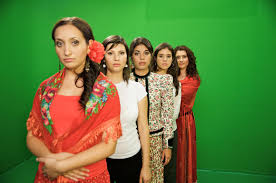EU Agency for Fundamental Rights Help Roma Women Break the Cycle Of Deprivation
Wednesday 08 March, 2017 Written by Simon Collyer
Roma women have long been held back by inequalities, poverty, dire living conditions and a lack of opportunities, says the European Union Agency for Fundamental Rights (FRA) on International Women’s Day on 8 March.
“Too often Roma women fare far worse than men, denied opportunities to get the skills they need to find work,” said FRA’s Director Michael O’Flaherty. “We need to stand up for the rights of Roma women to help them break the chains that are holding them back from enjoying their human rights in life and in work.”
The Roma of Europe have never had meaningful access to their socio-economic rights. For women, the picture is especially bleak. They remain trapped in a vicious cycle of poverty, social exclusion and unemployment. Exclusion from education impedes their access to meaningful employment which condemns them to a life of poverty and poor housing conditions. Roma women then remain in poverty, with low education without employment opportunities, limiting their choices in later life.
A good education is the path to better jobs and better wages. But this road is closed to many young Roma women, who often drop out of secondary school without further training. Nearly three quarters of young Roma women aged 16-24 are not employed, in education or training, compared with over a half of young Roma men in the same age group, according to findings from the Agency’s second EU Minorities and Discrimination survey in nine EU Member States. In countries like Greece, Portugal and Hungary the gender gap was even more marked.
This gap translates to poorer job prospects: For example, only 20% of Roma women are in paid work compared with 41% of men. Often this is compounded by traditional gender roles where women do most of the domestic work in poor conditions without tap water, indoor bath, shower or toilet. Unsurprisingly, the health of Roma women also suffers.
Clearly, Member States need to protect Roma girls and women from discrimination and give them a real chance to break free from the cycle of deprivation. This means ensuring they stay longer in school, receive training and learning support. Businesses and local authorities need to create training schemes and work opportunities for Roma women. And Roma communities should enjoy a decent standard of living free of poverty. Local efforts to empower Roma women should also be used to boost inclusion, as FRA research has found.

1 comment
Leave a comment
Make sure you enter all the required information, indicated by an asterisk (*). HTML code is not allowed.
Join
FREE
Here










